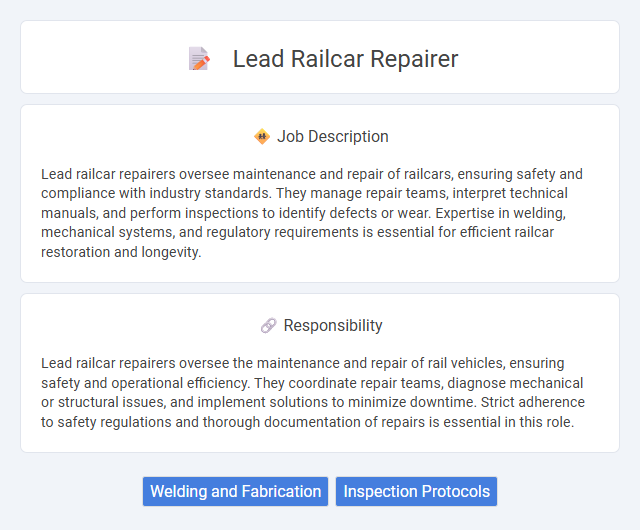
Lead railcar repairers oversee maintenance and repair of railcars, ensuring safety and compliance with industry standards. They manage repair teams, interpret technical manuals, and perform inspections to identify defects or wear. Expertise in welding, mechanical systems, and regulatory requirements is essential for efficient railcar restoration and longevity.
Individuals with strong attention to detail and good physical stamina are likely to be suitable for the role of a lead railcar repairer. Those who may experience difficulties working in physically demanding environments or who have limited mechanical aptitude might find this job challenging. A propensity for problem-solving and coordinating repair teams increases the probability of success in this position.
Qualification
Lead railcar repairers typically require extensive experience in mechanical and structural repair of railcars, combined with strong knowledge of safety regulations and industry standards. Certifications in welding, electrical systems, and hazardous materials handling enhance qualifications and demonstrate technical proficiency. Proven leadership skills and the ability to train and supervise repair crews are essential for effective team management and ensuring high-quality maintenance work.
Responsibility
Lead railcar repairers oversee the maintenance and repair of rail vehicles, ensuring safety and operational efficiency. They coordinate repair teams, diagnose mechanical or structural issues, and implement solutions to minimize downtime. Strict adherence to safety regulations and thorough documentation of repairs is essential in this role.
Benefit
Lead railcar repairer positions likely offer competitive salaries reflecting the specialized skills and responsibilities required. Benefits may include comprehensive health insurance, retirement plans, and paid time off to support employee well-being. Opportunities for career advancement and skill development might also be available, enhancing job security and professional growth.
Challenge
The role of a lead railcar repairer likely involves managing complex mechanical issues that demand advanced diagnostic skills and precision. Overseeing repair teams could pose challenges in ensuring safety compliance and maintaining tight schedules under pressure. The probability of encountering unexpected technical problems may require adaptability and quick decision-making to minimize downtime and optimize railcar performance.
Career Advancement
Lead railcar repairers oversee maintenance teams ensuring the safety and efficiency of railcar operations, positioning themselves as key experts in rail transport engineering. Mastery in diagnosing mechanical issues and managing complex repair schedules opens pathways to senior supervisory roles or specialized engineering positions within rail companies. Continuous skill development in advanced rail technologies and safety regulations significantly enhances prospects for career growth and higher compensation.
Key Terms
Welding and Fabrication
Lead railcar repairers specialize in welding and fabrication techniques to restore and maintain railcar structural integrity, employing arc welding, MIG, and TIG processes for precision repairs. They interpret blueprints and technical schematics to fabricate custom metal components, ensuring safety standards and regulatory compliance within the rail industry. Their expertise in metalworking materials, such as steel and aluminum, enhances the durability and performance of railcars under heavy operational conditions.
Inspection Protocols
Lead railcar repairers rigorously follow standardized inspection protocols to ensure the safety and functionality of railcars, including comprehensive checks of braking systems, wheelsets, and structural integrity. They utilize advanced diagnostic tools and detailed maintenance records to identify defects and compliance with industry regulations such as FRA standards. Adhering to these protocols minimizes downtime and enhances the reliability of railcar operations.
 kuljobs.com
kuljobs.com